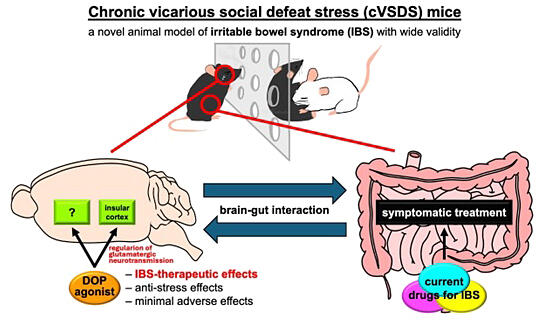On February 5, a research group led by Professor Akiyoshi Saitoh of the Department of Pharmacy, Faculty of Pharmaceutical Sciences, and Graduate Student Toshinori Yoshioka of the Graduate School of Pharmaceutical Sciences at Tokyo University of Science has announced that opioid δ-receptor agonists, promising new drugs with anti-stress effects, may be effective against irritable bowel syndrome (IBS). The findings are expected to contribute to developing new therapeutic agents for IBS and were published online in the international journal British Journal of Pharmacology on December 25.

Provided by Tokyo University of Science
IBS is characterized by recurrent gastrointestinal symptoms, such as diarrhea, constipation, and abdominal pain, without organic abnormalities in the intestines and is estimated to affect one in ten people worldwide. Currently, the only viable therapeutic strategy is symptomatic treatment. Although the exact cause remains unclear, psychological stress is considered to be deeply involved in the development of IBS.
To date, the research group has explored the potential of compounds that act on opioid δ-receptors as psychotropic drugs and their mechanisms of action. They have shown that mice exposed to emotional stress exhibit characteristic symptoms of IBS. They have also confirmed that opioid δ-receptor agonists show certain levels of effectiveness in patients with depression refractory to treatment with existing drugs. Opioid δ-receptor agonists may exert antidepressant effects at an earlier stage and have fewer adverse effects than existing drugs and are currently tested in clinical trials as novel antidepressants.
In this study, the research group focused on the abundance of opioid δ-receptors in the insular cortex, a brain region associated with visceral control. They studied whether opioid δ-receptor agonists were effective as anti-IBS agents. The insular cortex is a part of the cerebral cortex, and is deeply involved in emotions, such as delight, anger, sorrow, pleasure, and the accompanying bodily functions. Chronic vicarious social defeat stress (cVSDS) mice, a mouse model of depression produced by exposing the mice to witness attacks on other mice, were orally given vermilion Indian ink to evaluate the intestinal peristaltic activity based on the charcoal transit distance in the intestinal tract. Moreover, visceral hyperalgesia, an indicator of IBS, was evaluated based on the responses of the mice to an intrarectal injection of a small amount of capsaicin.
Mice with IBS with diarrhea underwent three different types of treatment with opioid δ-receptor agonists: systemic administration (subcutaneous injection), intracerebral administration (intracerebroventricular administration), and direct administration to the insular cortex. The results showed that administration of an opioid δ-receptor agonist regulated the activation of intestinal peristalsis and reduced behaviors associated with capsaicin-induced hyperalgesia, regardless of the administration methods. The measured glutamate levels in the insular cortex of mice with IBS showed that exposure to higher stress increased glutamatergic neurotransmission in the insular cortex, causing diarrhea symptoms. Meanwhile, the administration of an opioid δ-receptor agonist suppressed glutamatergic neurotransmission and ameliorated the diarrhea symptoms.
Saitoh said, "Currently available IBS drugs only provide low levels of patient satisfaction, and the development of new drugs is expected. The results of this study suggest that therapeutic agents targeting opioid δ-receptors may mitigate stress and improve IBS-like symptoms via the central nervous system. Although there have been drugs acting via the central nervous system, they are problematic because they are slow-acting and elicit adverse effects, such as nausea and vomiting, prior to the onset of therapeutic effects. Opioid δ-receptor agonists have the potential to overcome some of the problems with existing therapeutic drugs."
Journal Information
Publication: British Journal of Pharmacology
Title: Agonists of the opioid δ-receptor improve irritable bowel syndrome-like symptoms via the central nervous system
DOI: 10.1111/bph.17428
This article has been translated by JST with permission from The Science News Ltd. (https://sci-news.co.jp/). Unauthorized reproduction of the article and photographs is prohibited.




